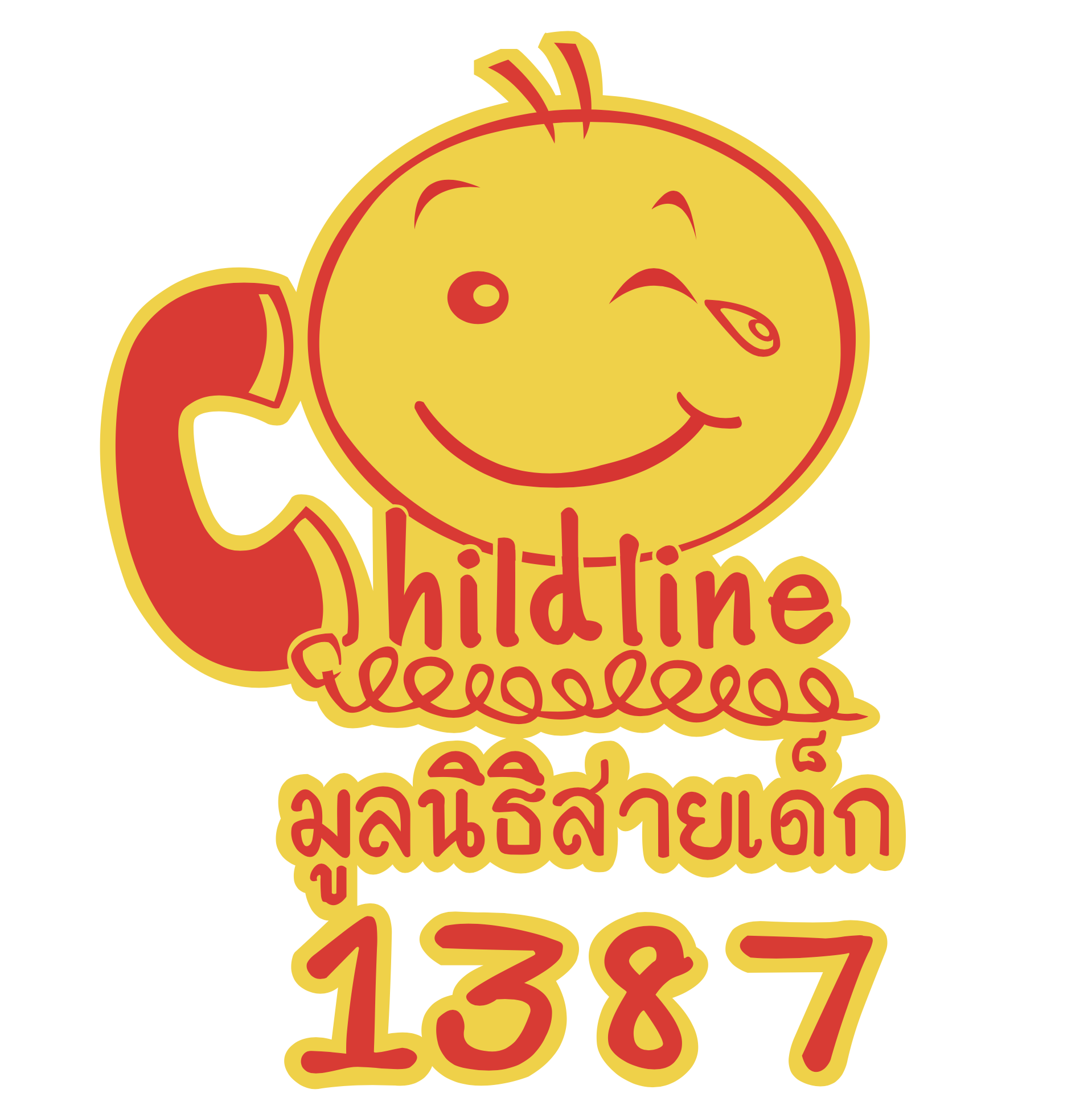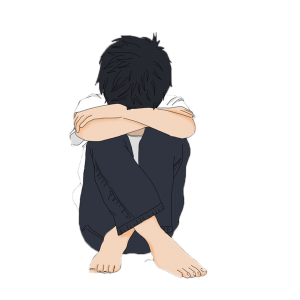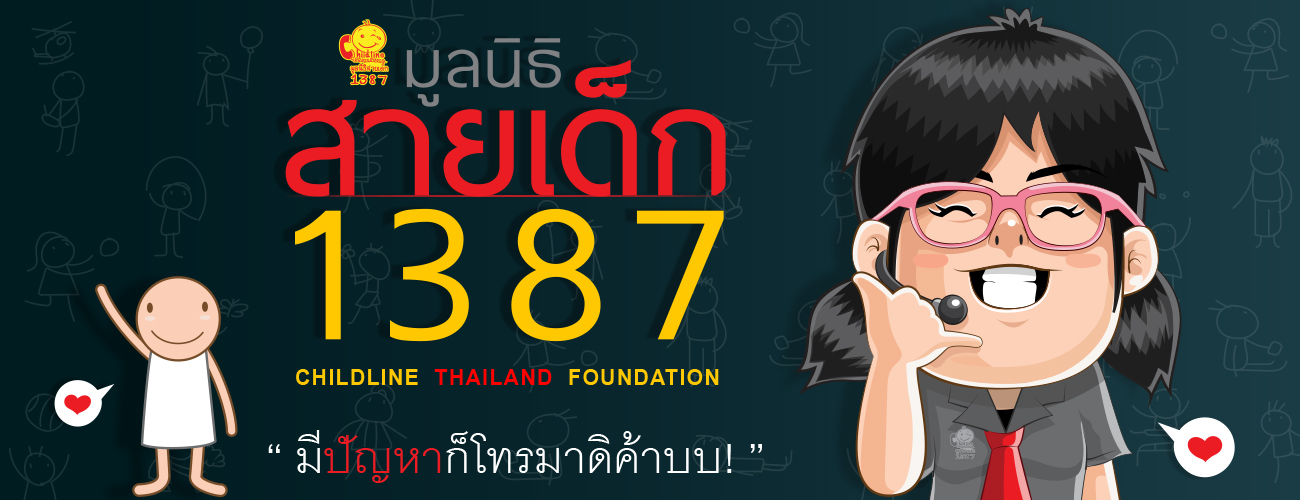
OUR STAFF ARE READY TO HELP 24 HOURS A DAY
The Childline Thailand call center, located in Bangkok, handles every phone call from all over the country. Staff in the call center are ready to take phone calls and respond to online messages 24 hours a day, 365 day a year – just like any other emergency support service.
HOW OUR CALL CENTER WORKS
Childline plans to expand its services by locating outreach offices throughout the country. The foundation aims to provide a regional focus that can appropriately allocate resources to improve on the speed and quality of assistance and referrals to children who require care and protection all over Thailand.
The call center is the direct link between children and support services and is, therefore, fundamental to the success of our work. We currently answer about 150,000 calls a year. However, according to estimates calculated on: telephone densities across Thailand; the number of children aged below 18 years old; children of minority groups; the recorded percentages of children whose rights are being infringed upon; and other statistical data, a call center developed to the maximum of its capacity has the potential to assist over 1.5 million children annually nationwide. As of 2019 the number of ongoing assistance cases is 669. Since 2009 we have successfully assisted 3563 significant cases.
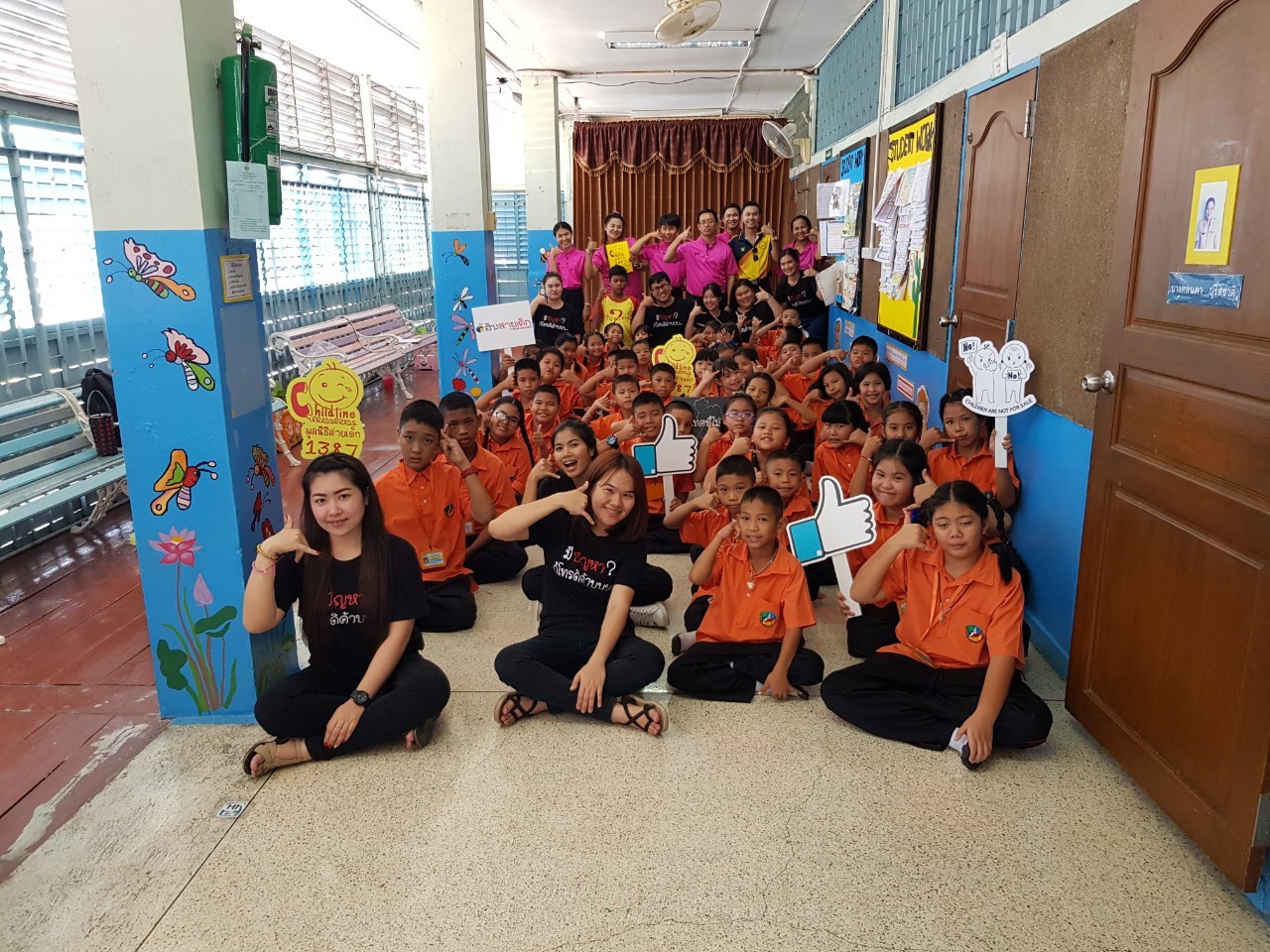
Stop commercial exploitation of children
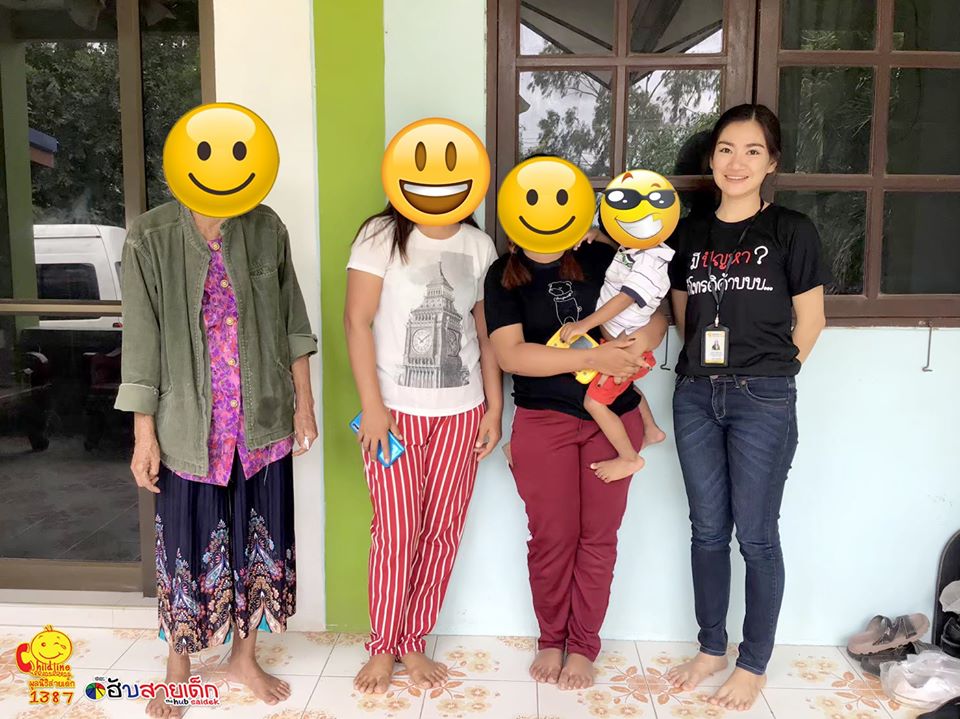
Home visit following up a case

Training for Plan International
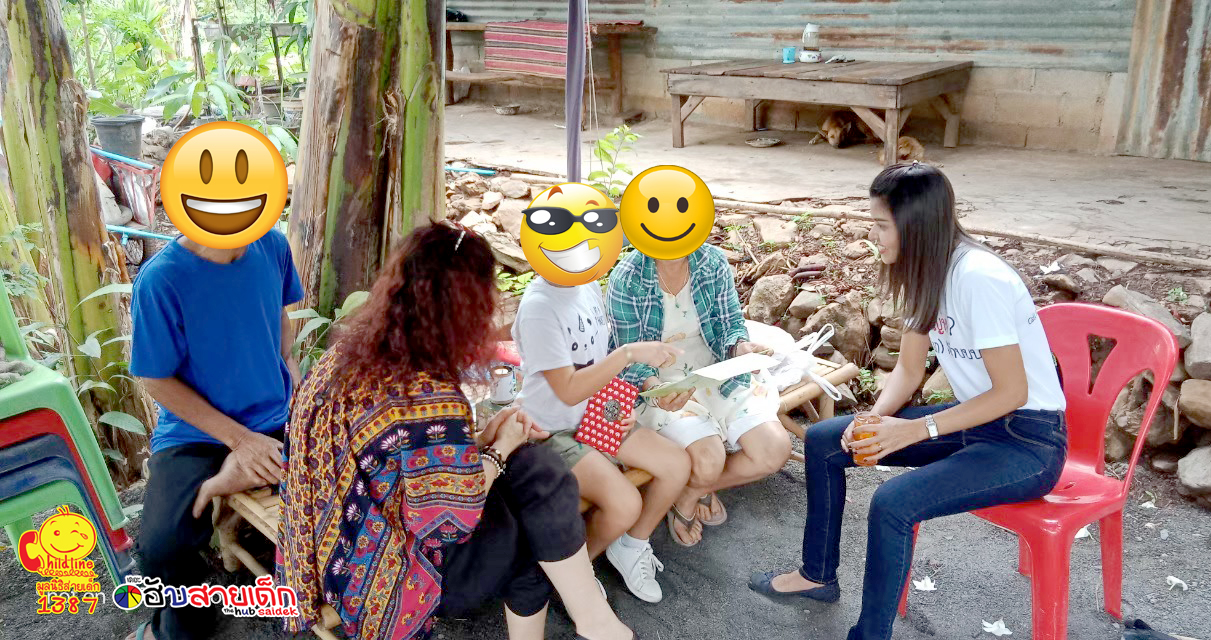
Following up on an adoption case
EVERY DAY CHILDREN AND ADULTS IN OUR COMMUNITY ARE IN SEARCH OF CRITICAL SERVICES
We can offer help with:
Emergency protection and care
HELPING CHILDREN & FAMILIES EVERY DAY
Childline staff assists children and families in multiple ways on a daily basis – problems range from lonelinessand family misunderstandings to severe abuse cases.
“Child abuse is more than broken bones and bruises. It leaves deep emotional scars which, if remain untreated, will haunt the child for the rest of his or her adult life”
EMOTIONAL ABUSE
Emotional abuse can include any of the following: child humiliation; name-calling; making negative comparisons to others; telling the child they are no good; frequent yelling, threatening behaviour or bullying; ignoring a child as punishment; limited loving physical contact; and exposure to violence or abuse between other individuals, even within the family. Examples of child neglect include a failure to provide all basic needs, such as food, clothing, cleanliness, schooling, supervision and a safe environment for the child to live in
PHYSICAL ABUSE
Physical abuse involves any form of physical harm done to a child. It can result in physical injury, brain damage, disability, as well as emotional, behavioural or educational problems. Physical punishment, even for educational purposes, constitutes physical abuse under the majority of legislation. Shaking, smacking, slapping etc., however subtle, is a form of physical abuse and can easily escalate to a more harmful form.
SEXUAL ABUSE
Sexual abuse is a form of abuse in which an adult or another child abuses a child for sexual stimulation. Child sexual abuse does not only apply to sexual intercourse with penetration, but also includes such actions as pressing a child to engage in sexual activities (regardless of outcome), indecent exposure of sexual organs to a child, displaying pornography to a child, actual contact against a child’s body, physical contact with the child’s private parts or using a child to produce pornography.
Mental health support
WE’RE HERE TO TALK TO YOU 24 HOURS A DAY
Childline Thailand‘s counseling on the phone is a very important part of our work. Besides calls for help that require immediate intervention, Childline Thailand operates a 24-hour free phone service for children and families who need advice but do not know where to turn to.
OUR STAFFS ARE READY TO TALK TO YOU 24 HOURS A DAY
For many people, the 21st century hub of information remains a labyrinth which they have no means of venturing in by themselves. Childline Thailand has six permanent telephone staff who are undergraduates majoring in Clinical Psychology and Sociology and recruited from Ramkamhaeng or Thammasart universities. Our other call centre staff are volunteers who are in their third or fourth year of university. For the time being, Childline has enough staff to answer two to three lines at the time.
Although we have received a 10 line extension facility from the Telephone Organization of Thailand, Childline still needs to do much more fundraising to fulfil the capacity with capable and well trained staff in order to serve children and families more efficiently. Over the past six years, Childline Thailand received an average of 150,000 calls per year. What we have found is that general information calls (and even prank calls) can eventually identify a very serious issue that needs immediate attention, such as children living in a very violent family environment or a very poor standard of living. Therefore, we give all calls seeking information and advice as much importance as calls requesting immediate intervention.
UNDERSTANDING
Appreciating the importance of every child and each family problem allows for mutual human respect to be communicated down the phone line. This leads to an efficient dialogue that can speed up the communication process leading to trust and cooperation. This is the first step to erase fear and uncertainty usually experienced by callers on their first call.
TRUST
Trust plays a major role in establishing a long term friendship until children and families feel secure that their problems will not be reported to the press or the police. Above all they must trust that Childline staff are well equipped to work with them to resolve a problem and can come up with various choices that might suit them. Staff are trained to know how to create trust around the confidentiality and privacy of the caller’s issue which, in turn, enables them to advise or assist in a very efficient manner. Often, Childline staff are asked not to tell parents about a teen pregnancy or love affair. This requires a great deal of sincere and frank discussion regarding what is best for the young adult and, with the child’s agreement, careful planning must be considered for Childline’s intermediation with the parents or immediate family members. These types of problems are being experienced by younger and younger children every day. It is no longer rare to find children as young as 12 or 13 years old to ask for this type of advice.
CO-OPERATION
Childline Thailand works hand-in-hand with children and families. Following well established trust, children and families can seek various options with Childline’s guidelines and assistance towards solutions. Nevertheless, at the end of the day, the decision is always up to the children and their families. Many people need help from Childline to assist them to find the information. With this information, Childline is often required to coordinate proceedings on the person’s behalf to make sure that they are getting the right kind of assistance.
Education
HELPING CHILDREN WITH THEIREDUCATION
Upon the call for help, Childline will connect with Government agencies such as The Ministry of education, the Ministry of Social Development and Human Security including various NGO’s for direct financial assistance to the child’s family.
CHILDLINE WORKS CLOSELY WITH FAMILIES, SCHOOLS AND THE MINISTRY OF EDUCATION
Thai schools are free and obligatory until the age of 15 for all Thai children nationwide. Although this law was meant to provide for Thai children only , Childline has managed to place a great many children without ID cards into primary and secondary school. This shows some efforts from the Ministry of Education to allow children to be educated while hoping to get some form of Thai ID card which will allow them to function as equals in Thai society in the future.
Childline works closely with families and schools nationwide for cases which require special attention such as :children needing school change to follow their parents working in a different province ,children with HIV, handicapped children ,abused children and children who strayed from school including children without documentations. This is where Childline comes in to bridge the gap between the families and the authorities. It is the missing link to start a new life.
Emergency legal aid
EVERY CHILD HAS THE RIGHT TO LEGAL PROTECTION
Under international law, every child is entitled to registration of his or her birth, including children born to irregular migrants. In practice, there are many problems in the implementation of this rule, leaving many children stateless.
“The child shall be registered immediately after birth, and has the right to a name and nationality, and to know and be cared for by his or her parents.
Article 7 on the Convention on the Right of the Child States: “The State shall ensure the implementation of the rights in accordance with national law and its obligation under the relevant international instruments in the field, in particular when the child would otherwise be stateless.”
In Thailand, although the real figure is unknown, it is believed that over one million children, born on Thai soil, of both Thai and migrant origins, such as Burma, Laos, Cambodia remain unregistered. The reasons why parents do not register their children at birth include: lack of awareness of the importance of the registration; the cost in both time and money in registering a new birth; the distance to a registry office; legal, social and cultural barriers: and for most migrants, fear of being caught for illegal entry. Thailand is party to the 1989 Convention on the Rights of the Child; however, it imposed reservations to the Convention when it rectified the Convention in 1992.
Violence in schools
KEEPING CHILDREN SAFE AT SCHOOL
Violence in schools is becoming an increasingly serious problem, especially violence involving weapons. School violence includes violence between the students, physical attacks by students on the school staff, and physical punishment or violent attacks by teachers and school staff on the children.
Thailand has long history of corporal punishment within the school system, and even though corporal punishment is now completely abolished and prohibited it is still quite often practised by Thai teachers without any sense of wrongdoing.
ABUSE FROM TEACHERS
Violent acts by a teacher rarely get reported as most consider it as a form of punishment. Even when the child tells his/her parents about it, the reply is: “What did you do wrong?” So children usually just keep quiet and the whole continues to be ignored by everyone. When Childline Thailand receives a call regarding a child being subjected to violence by a teacher, we immediately officially notify the school’s Principal and report the act of violence to the Ministry of Education. If it is the teacher’s first transgression, and the physical affect of violent act is minimal, all that can be done is the issuance of an official warning to the teacher. Therefore, in some cases, parents prefer just to change their child’s school so as to prevent any further repercussions.
BULLYING
Bullying seems to be the most widespread form of peer-to-peer violence. Bullying covers any form of physical, verbal or emotional attack such as hitting, pushing, pulling hair, teasing, calling names, extortion, etc. Usually, if violence takes place within the school compound, it remains there. Witnesses, victims and perpetrators either accept it as a normal way of life or are silenced by fear and shame.
Many factors have to be taken into account in the case of bullying. Most bullied children are absolutely terrified of the bullies. Bullies usually come in a group, and if so, intervention has to address all members of the group. The bullied child is usually ashamed to acknowledge the fact to their parents for fear of shame of being “not up to defending themselves”. Bullying usually requires the cooperation of parents, teachers, school staff and other students. Victims of prolonged bullying usually suffer from low self-esteem, social anxiety and other consequences; therefore, it is advisable for child in these circumstances to undergo a psychological evaluation to ensure that no long term damage has been done.
Health
Emergency Financial Assistance
ECONOMIC INEQUALITY IN THAILAND
Thailand’s economic growth over the last two decades has been very impressive. According to UNICEF, poverty has fallen around two thirds since 1990, even despite the 1997 economic crisis. However, huge income disparities remain and benefits of economic progress have not been shared by all the children in Thailand.
MANY FAMILIES THAT CALL CHILDLINE FOR FINANCIAL HELP TO SUPPORT THEIR CHILDREN USUALLY FALL BELOW THE POVERTY LINE.
Families in these situations tend to find they lack regular jobs, live in dilapidated housing and usually have histories of substance abuse and violence. Children from such homes can be deprived of the whole range of child rights to which they are entitled.
GAPS IN FAMILY FINANCING
Even though violence and abuse do seem to happen more often in poverty circumstances it can be best attributed to the quality of parenting rather than the poverty itself. We have had many calls for financial assistance where even though families were poor, they have managed to look after their children well, and just require a little extra funding to secure the child with all the basic needs to continue to develop happily within the security of their home. Another common occurrence is when children are left with their grandparents, while parents migrate to the urban centers in search of work. Grandparents quite often try their best, despite their old age, and a bit of extra funding can significantly improve the child’s quality of life. On the other hand, Childline does come across many children who suffer neglect and loneliness within the homes of a well-to-do or a middle income family. In a way, it can be more difficult for a child of a middle or upper income family to seek help for fear of bringing shame upon the family.
Although the financial situation of the family has a direct impact on a child’s life, it is by no means the deciding factor leading to child abuse, violence or exploitation. While in some poor northern areas of Thailand, a family might turn to selling their children for trafficking and exploitation, other families who are equally poor would never consider even the slightest possibility of doing so. Childline staff have to be very discerning of the various types of parents and parenting practices to verify whether a call for financial assistance is a genuine call for some extra help or whether the parents just seeking to live off the financial assistance for their child. The best interests of the child always have to be considered first.
